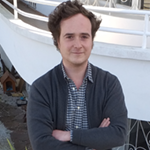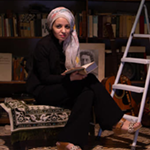from Like a Dwarf Inching Toward Legend
in that country, they say the calm sea is like oil
and when the temperature rises
they dive carelessly
in leaping
like hunks of potato
cut roughly by a mother
so as not to swallow the children, it comes and goes caressingly
sometimes poor men cast off across it in small, narrow boats
like they cast off bad luck, spilling bad-omened blood
they abandon their bodies there, offerings
they know the sea is easy and undemanding
you need not be a princess or a beauty
it gladly accepts men with chronic coughs
in their throats, heartbreak, phlegm, an Adam’s apple
their teeth rotten
**
the invaders are gone
they left their blue eyes
affixed to buildings as white as their skin
to watch over the new residents
to wink at the sea, making its waves bow down before the prospect of invaders
the villagers never found user’s guides to these houses
no instructions to help them repair the damages
so they resorted to old ancestral ways
they started to tear out those eyes
eye after eye
replacing them with wooden eyes, the color of their eyes
sometimes hiding them
behind the washing or thick curtains
like a pirate hiding his own missing eye
**
on the roof across the way, a green sofa
(for a king who lost his throne long ago)
turns its back to the sea and to the crumbling city
no one ever sits on it
surrounded by satellite dishes clinging
like pawns hesitating to put themselves to death
in front of it, a swath of pale red tiles
(and a blind chimney)
to its right, an elegant glass roof
to remind it of old glories
nobody remembers how it got up there
the building’s stairs are reliably narrow
the wooden elevator fits only two slender people
but it is, no doubt, like the thrones of that city
(dropped down by angels, planes, or pigeonbacks)
never to go back down
**
the woman who told him the elevator wasn’t working, wasn’t good for anything
doesn’t know that same elevator was the inspiration for a poem
“the elevator is stuck
between floors
it no longer remembers
where it was going
when the director decided to replace
its silent motion
with the sound of tenants’ feet”
he imagines a hanged body
that no one dared to bury
a testimony to the dead’s descent
and the mourners’ ascent
and the familiar ghosts rising from them
unfulfilled dreams and disappointment
and because its body is made all of wood
it took on, over time, a delicious odor
the woman who paused beside his door to rest
doesn’t know that if it weren’t for the broken elevator
I wouldn’t remember all those years
panting up the stairs
**
that city’s balconies sag
the way old breasts sag
weightlessly (and wrinkling)
till they graze bellies molded by time
old men die
either from boredom
or from some disease that strikes after seventy
but sometimes it’s a balcony that kills them
those men who raise their eyes (surreptitiously)
or glance at bosoms passing by
when they were little gods with their legs dangling down
they’d hurl water at passersby
who’d hurl insults and curses back up at them
and sometimes after making love
they’d go out to smoke a cigarette
and let out a long sigh
**
the city loses its whitewashed buildings
one after the other
like an old woman loses teeth
its residents shoot off fireworks in broad daylight
when specters of success or marriage come to haunt them
or when they tire of sharing their balconies with pigeons
those residents nested in their whitewashed buildings
like rot in a wisdom tooth
aren’t blind
but still, they stare into the sun and shoot off fireworks
clapping, cheering, jubilating
like cavemen
who know the reign of the night is long gone
**
Translators’ Note:
Like a Dwarf Inching Toward Legend is a cycle of thirty-five poems by Lamis Saidi. Taking Algiers as its protagonist, the collection explores the postcolonial city.
Describing Algiers’s colonial-era ville nouvelle, the poet sees a universe created in the image of the European settlers and adapted to their small nuclear families and peculiar way of life. When Algerians appropriated these buildings after 132 years of colonial rule, they were confronted with the concrete legacy of France’s mission civilisatrice. But instead of simply adopting the lifestyles imposed by the city’s colonial architecture, these new inhabitants superimposed their domestic habits onto a foreign infrastructure. Like a Dwarf Inching Toward Legend explores this process of reverse settlement as the inhabitants of Algiers reclaim spaces while simultaneously subverting the ideological positions staked out by their very architecture.
Algiers, with its crumbling kasbah rising above wide colonial boulevards (now rebaptized after Algerian revolutionaries), is emblematic of the postcolonial city. Using vivid imagery and an Algerian-inflected Arabic, Like a Dwarf Inching Toward Legend develops an evocative series of snapshots of daily life, offering a nuanced reflection on what it means to be Algerian today.
Working collaboratively on the translation has allowed us to balance out each other’s translatory idiosyncrasies and to engage deeply with the poems’ many-layered meanings. Of course, most translations are collaborations anyway: to negotiate meaning, the translator often must call upon others to fill in the unsaid or simply for a second opinon. And indeed, our collaboration has been much more than a two-person affair. We’d like to thank Zin Ali Gharsallah-Nuernberg and Ouardya Ammour for generously reading and re-reading our drafts and for sharing Algerian idioms, historical anecdotes, and cultural insights with us. We’d also like to thank Lore Baeten for her invaluable assistance negotiating the intricacies of formal Arabic’s grammar.

KOEN DE CUYPER earned an MA in translation from the University of Leuven, during which time he spent a year in residence at the Cadi Ayyad University in Marrakech. He currently lives and works in Rabat where he is the scientific information specialist at the Dutch Institute in Morocco (NIMAR). De Cuyper’s translations from the Arabic have appeared in Asymptote, Two Lines, and elsewhere.

HODNA BENTALI GHARSALLAH NUERNBERG holds an MA in francophone world studies and an MFA in literary translation, both from the University of Iowa. Her translations from the French and the Arabic have appeared in Anomaly, Asymptote, QLRS, Poet Lore, Two Lines, and elsewhere. Nuernberg lives in Morocco, where she serves as an editor-at-large for Asymptote and works as a translator for film and TV. Her co-translation of Raphaël Confiant’s Madam St. Clair, Queen of Harlem was published by Diálogos in January 2020.

LAMIS SAIDI is an Algerian poet and translator. She has published four poetry collections, including [As Usual, I Forgot My Suitcase] (2007), [To the Movies] (2011), [As a Ravaged City] (2017), and [Like a Dwarf Inching Toward Legend] (2019), as well as one biographical work [Room 102] (2015). Her writing has been translated into Dutch, French, and Spanish. She has also translated many poets, including Rabah Belamri, Emily Dickinson, Anna Gréki, Yamina Méchakra, Henri Michaux, and Pier Paolo Pasolini. Fluent in both Arabic and French, Saidi’s translation work seeks to redefine Algeria’s literary canon while bringing the country’s Francophone and Arabophone literary traditions into dialogue. Learn more at her website.

 BACK TO ISSUE
BACK TO ISSUE